Final report for SLA16-002
Project Information
The Louisiana State University AgCenter (LSUAC) in collaboration with the Southern University Agricultural Research and Extension Center (SUAREC) will implement and support programs that enhance the capabilities of Louisiana’s agricultural professionals in the area of sustainable agriculture. Themes for 2016 – 2017 include: pastured poultry, fruit crops, small ruminants, fall garden and the Louisiana Sustainable Agriculture Working Group (LA SAWG) annual meeting, as well as regional sustainable agriculture related conferences and workshops. LSU AgCenter and SUAREC personnel will be strongly encouraged to attend the training sessions. Information delivery systems to be utilized include workshops and long-distance education training sessions, field trips, resource manuals and informational bulletins. The Louisiana Sustainable Agriculture Advisory Board will meet twice annually for programmatic planning and evaluation. The Program Assistant (half-time), funded by this project, will be responsible for maintaining the state SARE website (http://www.southernsare.org/SARE-in-Your-State/Louisiana) and Louisiana SARE Facebook page (https://www.facebook.com/LouisianaSARE/). The other duties for this position include assisting in coordination of the state workshops and field days, the SSAWG scholarships and arrangements, the sustainable agriculture materials generated by the project, promotion of SARE resources and grant opportunities, and development of on-line and hard copy sustainable agriculture resources. Louisiana SARE maintains its presence is statewide sustainable agriculture through the SSARE event calendar, the Facebook page and events, and through connections with other prominent sustainable agriculture websites.
The Louisiana SARE main objective is to train county agents, mentor farmers, and agriculture professionals who will share their sustainable agriculture knowledge and expertise directly with farmers, land-owners, and the public. The overall objectives of the Louisiana Model State Plan (MSP) are:
· Maintain the state SARE website with sustainable agriculture materials and resources, and links to related state organizations.
· Conduct workshops on sustainable agriculture for extension and agriculture professionals.
· Conduct bi-annual state advisory board meetings with the purpose of revising and modifying the strategic plan.
· Identify annual training objectives with the input from the Louisiana Sustainable Agriculture Advisory Committee.
· Encourage extension and agricultural professionals to continue to attend sustainable agriculture meetings such as the Southern Sustainable Agriculture Working Group annual meeting.
· Continue participation in workshops, meetings and field days that highlight sustainable agriculture practices.
· Promote the SARE program results, resources and grant opportunities in Louisiana.
The Model State Plan (MSP) for Louisiana allows for enhanced programming effort beyond the state plans of work for the separate institutions (Southern University Agricultural Research and Education Center, Louisiana State University AgCenter). The MSP has allowed for the increased number of training sessions per year and the Louisiana SARE PDP program to have greater resources available for training activities, using the Southern SARE Louisiana webpage for sustainable agriculture resources, as well as increased coordination and networking. The hiring of a program assistant through the SARE PDP allowed for a unified sustainable agriculture programming effort for the state.
Advisors
- (Educator)
- (Educator)
- (Educator)
- (Educator)
- (Educator)
Education
The SARE PDP will emphasize an interdisciplinary and participatory approach to training. Training will range from beginner to intermediate and be provided in a classroom environment followed by hands-on experiences and demonstrations such as field days and on-farm tours to fortify training subject matter in a variety of ways. Handouts will be provided for attendees to follow along during the training, in order to take notes, and to review after the workshop is over. Subjects for trainings include cover crops, high-tunnels, marketing, integrated pest management, small ruminants, pollination, horticulture, local food systems, and soils. The primary audiences for the trainings are 1862 and 1890 extension agents, NRCS conservation field staff, and other agriculture professionals and mentor farmers. Agriculture professionals and those who train farmers and serve small-scale, minority, and limited resource farmers as well as those who serve larger-scale conventional farms will be encouraged to attend. Educational program participants will increase their competency and skills in areas related to sustainable agriculture. Participants will have increased confidence and knowledge that will enable them to respond to client inquiries with knowledge and authority regarding sustainable agriculture principles and practices.
Education & Outreach Initiatives
A Fall gardening workshop will be conducted to train farmers, extension agents, teachers, community garden leaders to address issues and increase knowledge in such areas as edible landscapes, fruit tree and vegetable grafting, school and community gardens, fall vegetable planning and planting.
After several reports that the August 2016 flood waters contained chemicals and both human and animal waste, many farmers and gardeners in Baton Rouge and the surrounding areas where flooding took place were wondering about the health of their soil.
With that fact in mind, the Southern University Ag Center themed its 2016 Fall Gardening Workshop “Recovering Your Soil – Gardens, Farms and Spirit!”
Southern University Ag Center Vice Chancellor for Extension, Dr. Dawn Mellion-Patin also addressed the attendees and explained why the SU Ag Center holds the Fall Gardening Workshop on the week of Thanksgiving every year.
“We started this workshop four years ago and it is held at this time any year because we wanted to give the teachers and farmers an opportunity to come and take information back to their schools and communities.” Dr. Dawn Mellion-Patin
Other presentations included a hands-on demonstration on ‘Healthy Soils’ by USDA Natural Resources Conversation Services State Soil Scientist, Michael Lindsey, which discussed the importance of having cover crops to reduce soil run-off; ‘Collecting Soil Samples Correctly,’ which explained the proper way to collect a soil sample and where the sample should be taken to be tested; ‘Flood Resistant Trees for Louisiana’s Climate,’ which provided examples of the various water resistant trees that grow in the state as well as ways to plant trees in a manner that will allow them to serve as a barrier against flooding; ‘Is Produce Safety Important?,’ which explained the importance of following safety rules and regulations when growing and harvesting produce; and ‘Growing with the Seasons,’ which discussed the types of fruits and vegetables that can be grown in each season.
The Fall Gardening Workshop was co-sponsored by the Southern University Ag Center, its Wisteria Alliance Program, and the Sustainable Agriculture Research and Education (SARE) Program.
The workshop, which was held at A. O. Williams Hall – SU Ag Center –, drew a crowd of more than 80 Ag professionals, urban farmers, farmers, and school and community garden coordinators.
Attendees were also able to participate in a hands-on fig propagation, greenhouse production, or wreath and bow making demonstration.
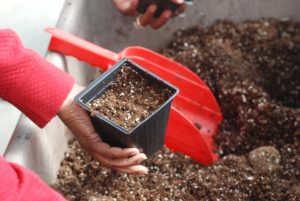
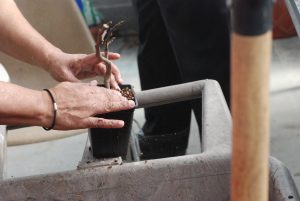
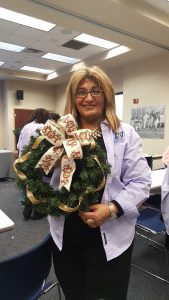
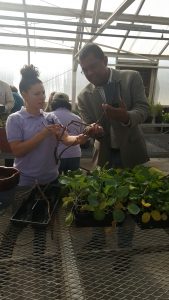
This workshop taught farmers and ranchers how to successfully become entrepreneurs, to start and grow a business within the state successfully.
The theme of the meeting was: “From Start to Future: Building an Ag Business Step by Step.” Mila Berhane, SU Ag Center Senior Research Associate, was one of the speakers at the event which took place at the Southern University Ag Center. Other Farmers shared their experience on how to develop their enterprises.
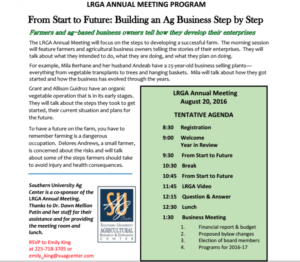
More than 20 farmers and ranchers attended along with county agents, Ag professionals, and mentor farmers who were trained at the event and will take their expertise to work directly with farmers.
A SSAWG conference allows for networking of farmers, extension agents, teachers, community garden leaders, restaurateurs, and NGOs to address issues and increase knowledge in such areas as sustainable agriculture, local food systems, farm to school and work together to form recommendations for barriers to the success of farmers and ranchers.
Selected Ag professionals and extension agents from Southern University and LSU, as well as mentor farmers, were able to travel to Lexington, Kentucky.
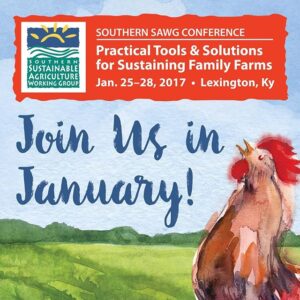
We were able to secure funds for 20 scholarships. Due to our large group, we decided to charter a bus.
County agents, Ag professionals, and mentor farmers were trained at the event and will take their expertise to work directly with farmers.
The workshop focused on the topics of
• Soil Preparation tips
• Greenhouse maintenance
• The benefits of hoop houses and raised beds
SCRI hosted a community- and school-based gardening workshop.
School and community garden coordinators, farmers and backyard gardeners were invited to attend the workshop, which was free and open to the public.
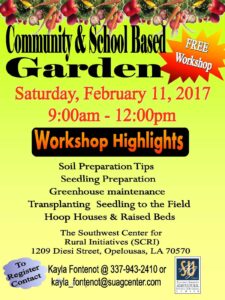
Attendees also had the opportunity to participate in hands-on activities that included
• Seedling Preparation
• Transplanting Seedlings
Attendees were provided with seedlings and seeds for the spring planting. More than 50 people attended this event.
This training session brought farmers in Jamaica together to learn about organic farming and sustainable agriculture.
Mila Berhane assisted Dr. Owusu Bandele and Ms. Sandra Simone in preparing Power Point presentations that Ms. Simone used during a two week organic training session in Jamaica in February, 2017. Sandra Simone, an organic farmer in Alabama, presented on behalf of the Southeastern African American Organic Network (SAAFON), of which she is a member. Mila Berhane also provided other materials for the training session in Jamaica, including handouts and thumbdrives containing the SARE Library of Publications.
The session was attended by a group of eleven farmers interested in organic farming.
The conference was designed to provide expanded awareness of educational opportunities, U.S. Department of Agriculture programs and services, and other resources to help small farmers stay in business.
The theme for this year was “Innovations and Resilience for Louisiana Small Family Farms.”
The conference was designed to provide expanded awareness of educational opportunities, U.S. Department of Agriculture programs and services, and other resources to help small farmers stay in business. The event was targeted at beginning farmers, small and urban farmers, agricultural business owners, community leaders, backyard gardeners, and community-based organizations.
Sessions were held on drone demonstrations, grant writing, soil health, farm labor, weather changes, and marketing. Other events during the conference included the Louisiana Living Legends Banquet and the graduation ceremony for the 2016 class of the Louisiana Small Farmer Agricultural Leadership Institute.
Mr. Brennan Washington, Minority Farmer/Outreach Specialist from SARE, was one of the presenters.
More than 100 farmers, agricultural professionals, students, extension agents from throughout the state gathered at the Southern University Agricultural Center for the seventh annual Louisiana Small Farmer Conference.
County agents, Ag professionals, and mentor farmers were trained at the event and will take their expertise to work directly with farmers.
Attendees learned how agriculture impacts their daily lives and how to sustain a healthy living through food.
Youth and adults experienced plants, live animal and food demonstrations, technology, and more.
A sensory vegetable and herb garden was set up for this event.
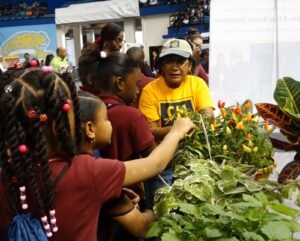
More than 3,000 students from elementary, middle, and high schools, along with adults, Ag Professionals, and farmers from throughout the city and surrounding parishes gathered at Southern University’s Felton G. Clark Activity Center on March 21, 2017 to celebrate National Ag Day.
This event was part of the Ascension Parish Master Gardeners Association’s library series of educational workshops with gardening and landscaping tips geared to gardeners, extension agents and Ag professionals.
Mila Berhane conducted a workshop on “Gardening to Attract Pollinators,” hosted by the Ascension Parish Library, Dutchtown, on March 21. This event was part of the Ascension Parish Master Gardeners Association’s library series of educational workshops with gardening and landscaping tips geared to gardeners, extension agents and Ag professionals.
More than 50 people attended. SUAREC factsheets on milkweed to attract butterfly were distributed and two SARE books titled “Manage Insects on your Farm” were donated as door prices.
This series of workshops on pest management are a follow-up to our winter workshops around the state on the use of high tunnels, which are increasingly popular with small and medium-scale market gardeners in order to extend the growing season and increase farm profitability.
The Louisiana Sustainable Agriculture Research and Education (SARE) Program and U.S. Department of Agriculture Natural Resources Conservation Service offered workshops on pest exclusion in high tunnels, or hoop houses, and the proper use of alternative pesticides.
The presenter for these workshops was Ayanava Majumbar, an extension entomology specialist who works with the SARE program at Auburn University and has conducted research on high tunnel production as well as alternative and integrated pest management for horticultural crops.
The High Tunnel Pest Exclusion and Proper Use of Alternative Insecticides Workshops are a follow up to the High Tunnel Production Workshops that were presented earlier in 2016 around the state.
County agents, Ag professionals, and mentor farmers were trained at the event and will take their expertise to work directly with farmers.
Researchers, farmers, extension agents, and natural resource personnel from across the Southern region gathered to learn about and discuss cover crops at CEFS’ Field Research and Outreach Facility at Cherry Farm in Goldsboro and the University of Mount Olive (UMO).
Over two days in July 2016, the Center for Environmental Farming Systems and Southern SARE hosted the first-ever Southern Cover Crop Conference.
Day two of the conference took place at CEFS’ Field Research and Outreach Facility, with 13 field demonstrations that attendees could tour and learn from. Demonstrations included cover crop use in cotton, corn, soybeans, and in hoop houses. Attendees could see warm-season and unusual cover crops in the field, as well as equipment for termination, residue management, and planting. Four demonstrations had set times for presentations, while the rest of the demonstrations were set up like a county fair – anyone could go by the demonstration to tour and learn at any time.
After the field demonstrations, the initial meeting of the Southern Cover Crop Council (SCCC) gathered in order to start planning for the Council’s future. The SCCC will consist of representatives from states and territories of the Southern SARE region who will collaborate on cover crop research, extension outreach, and information dissemination.
This Conference was funded, in large part, thanks to grant from the Southern SARE program. The conference was organized by leaders in extension and research throughout the Southeastern U.S.
Over two days in July 2016, the Center for Environmental Farming Systems and Southern SARE hosted the first-ever Southern Cover Crop Conference. Researchers, farmers, extension agents, and natural resource personnel from across the Southern region gathered to learn about and discuss cover crops at CEFS’ Field Research and Outreach Facility at Cherry Farm in Goldsboro and the University of Mount Olive (UMO). On the first day of the conference at UMO, over 45 speakers covered topics ranging from economics to nutrient management to equipment. New research, challenges for implementing cover crops, and solutions to those challenges were discussed.
Fact sheets from the conference’s workshops and field demonstrations are available on the CEFS website and in hard copy from Southern SARE. This conference fueled excitement for cover crops in the Southern region, and will serve as a launch for new cover crop projects and an increase in cover crop use in our region.
County agents, Ag professionals, and mentor farmers were trained at the event and will take their expertise to work directly with farmers.
The goal of the MarketReady workshops is to lead and educate small-medium scale farmers, to increase to amount of local produce sourced in schools and other institutions within Louisiana, to encourage a more tight-knit community. To teach farmers best practices in how to market, price, and sell their produce at farmers markets, to schools, restaurants, and wholesalers. MarketReady provides professional marketing education to improve sales relationships and get you up to speed with the latest local food programs and resources.
The training is based around best business practices identified by buyers, for example: pricing, insurance, packaging, and good agricultural practices in markets that are actively seeking to engage local suppliers.
The MarketReady Producer Training Program is for those interested in selling products to restaurants, grocers/wholesalers/retailers, and schools/institutions.
The MarketReady Producer training was held in Baton Rouge, Monroe, and Lafayette in the 2016-2017 year.
The workshops have produced better trained farmers with an increased interest in selling to local schools and institutions and to further the consumption of locally harvested produce. The farmer attendees left with better connections to leaders in the school system, restaurant industry, and wholesale procurement; and the buyers in-turn left with more direct connections to farmers, as well as an increased desire to purchase local.
County agents, Ag professionals, and mentor farmers were trained at the event and will take their expertise to work directly with farmers.
To teach goat and sheep producers about herd health, new guidelines, mobile technology, marketing, alternative warm and cool season forages, and feed directives.
Small ruminant experts from both the SU and LSU Ag Centers will make presentations on forage management, nutrition and health interaction; distiller grains; infectious and parasitic diseases; small ruminant reproduction and drug use/ off label issues.
Topics of discussion will include: Herd Health and new guidelines; Mobile Technology and Marketing; Alternative Forages; Feed Supplementation; Food Safety, and etc.
Demonstrations & Hands-On Activities: Wet Lab (Fecal Egg Count); Goat Meat Product Development & Tasting; Practical Animal Husbandry Techniques; and Soil and Forage sampling.
Small ruminant (sheep and goat) experts from both the SU and LSU Ag Centers made presentations on forage management, nutrition and health interaction, infectious and parasitic diseases, small ruminant reproduction and drug use/off label issues. Producers also participated in a FAMACHA certification course. FAMACHA (pronounced FAffa MAlan CHArt) is a diagnostic tool that helps farmers identify parasite infection in small ruminants, such as sheep and goats. The tool is a chart that matches eyelid color to anemia levels, an indicator of parasite infection. FAMACHA was developed in South Africa and is distributed in the United States through the American Consortium for Small Ruminant Pest Control.
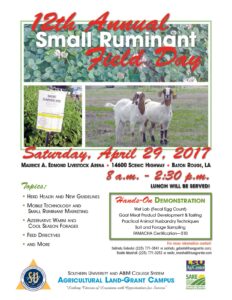
Nearly 50 participants turned out for the event, which also featured demonstrations and hands-on activities on injections, fecal sample analysis, body condition scoring and a question and answer session with presenters. Goat and sheep meat products were on the lunch menu. County agents, Ag professionals, and mentor farmers were trained at the event and will take their expertise to work directly with farmers.
Educational & Outreach Activities
Participation Summary:
Learning Outcomes
Project Outcomes
The training sessions and programs discussed above had the following outcomes:
- Increase awareness of SUAREC and LSU AgCenter extension and research programs.
- Knowledge of resources that are available to Agricultural professionals regarding all the topics above mentioned.
- Increase request for information regarding topics on sustainable agriculture.
- Increase interest from Agricultural professionals, extension agents, farmers in attending sustainable agriculture events around the state.
- Greater regional impact
- Increased collaboration of research and extension personnel in sustainable agricultural programs
- More awareness about SARE programs. Brochures are made available at each event.
- SARE books and jump drives have been given to Agricultural professionals, extension agents and attendees to each event.
All these events have been partially or fully funded with SARE funds.
SARE should offer trainings or put on a conference dedicated to farm to school at the University level or beginning and running a campus-based farm.